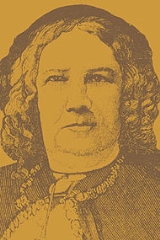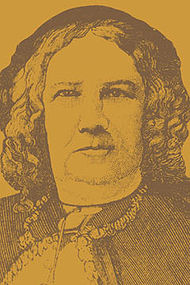
Nísia Floresta
Encyclopedia

Rio Grande do Norte
Rio Grande do Norte is one of the states of Brazil, located in the northeastern region of the country, occupying the northeasternmost tip of the South American continent. Because of its geographic position, Rio Grande do Norte has a strategic importance. The capital and largest city is Natal...
, October 12, 1810 — Rouen
Rouen
Rouen , in northern France on the River Seine, is the capital of the Haute-Normandie region and the historic capital city of Normandy. Once one of the largest and most prosperous cities of medieval Europe , it was the seat of the Exchequer of Normandy in the Middle Ages...
, France
France
The French Republic , The French Republic , The French Republic , (commonly known as France , is a unitary semi-presidential republic in Western Europe with several overseas territories and islands located on other continents and in the Indian, Pacific, and Atlantic oceans. Metropolitan France...
, April 24, 1885) was a Brazil
Brazil
Brazil , officially the Federative Republic of Brazil , is the largest country in South America. It is the world's fifth largest country, both by geographical area and by population with over 192 million people...
ian educator, writer
Writer
A writer is a person who produces literature, such as novels, short stories, plays, screenplays, poetry, or other literary art. Skilled writers are able to use language to portray ideas and images....
, poet
Poet
A poet is a person who writes poetry. A poet's work can be literal, meaning that his work is derived from a specific event, or metaphorical, meaning that his work can take on many meanings and forms. Poets have existed since antiquity, in nearly all languages, and have produced works that vary...
and feminist.
She is considered the "first Brazilian feminist" and possibly the first still in the 19th. century to break through public-private boundaries by publishing her works in newspapers, when the local press was just beginning. She also coordinated a girls' school in Rio de Janeiro
Rio de Janeiro
Rio de Janeiro , commonly referred to simply as Rio, is the capital city of the State of Rio de Janeiro, the second largest city of Brazil, and the third largest metropolitan area and agglomeration in South America, boasting approximately 6.3 million people within the city proper, making it the 6th...
and wrote a book in defense of the rights of women, Native Americans
Indigenous peoples of the Americas
The indigenous peoples of the Americas are the pre-Columbian inhabitants of North and South America, their descendants and other ethnic groups who are identified with those peoples. Indigenous peoples are known in Canada as Aboriginal peoples, and in the United States as Native Americans...
and slaves.
Her first book, and the first in Brazil to deal with women's rights to education and work, Women's rights and men's injustice, was inspired by Mary Wollstonecraft
Mary Wollstonecraft
Mary Wollstonecraft was an eighteenth-century British writer, philosopher, and advocate of women's rights. During her brief career, she wrote novels, treatises, a travel narrative, a history of the French Revolution, a conduct book, and a children's book...
´s A Vindication of the Rights of Woman
A Vindication of the Rights of Woman
A Vindication of the Rights of Woman: with Strictures on Political and Moral Subjects , written by the 18th-century British feminist Mary Wollstonecraft, is one of the earliest works of feminist philosophy. In it, Wollstonecraft responds to those educational and political theorists of the 18th...
. It was not limited to a translation
Translation
Translation is the communication of the meaning of a source-language text by means of an equivalent target-language text. Whereas interpreting undoubtedly antedates writing, translation began only after the appearance of written literature; there exist partial translations of the Sumerian Epic of...
, but also extended to a large insight of the Brazilian reality. It can be considered the first feminist text of Brazil and South America, since there are no records of a previous text concerning this matter. She continued her work writing three other books:
- Conselhos a minha filha (1842)
- Opúsculo humanitário (1853)
- A Mulher (1859).
External links
- Book analysis at Scielo: Nísia Floresta, O Carapuceiro e outros ensaios de tradução cultural and
- nature, nurture and nation: Nísia Floresta's engagement in the breast-feeding debate in Brazil and France
- Nísia Floresta Brasileira Augusta: pioneira do feminismo brasileiro - séc. xix Constância Lima Duarte

